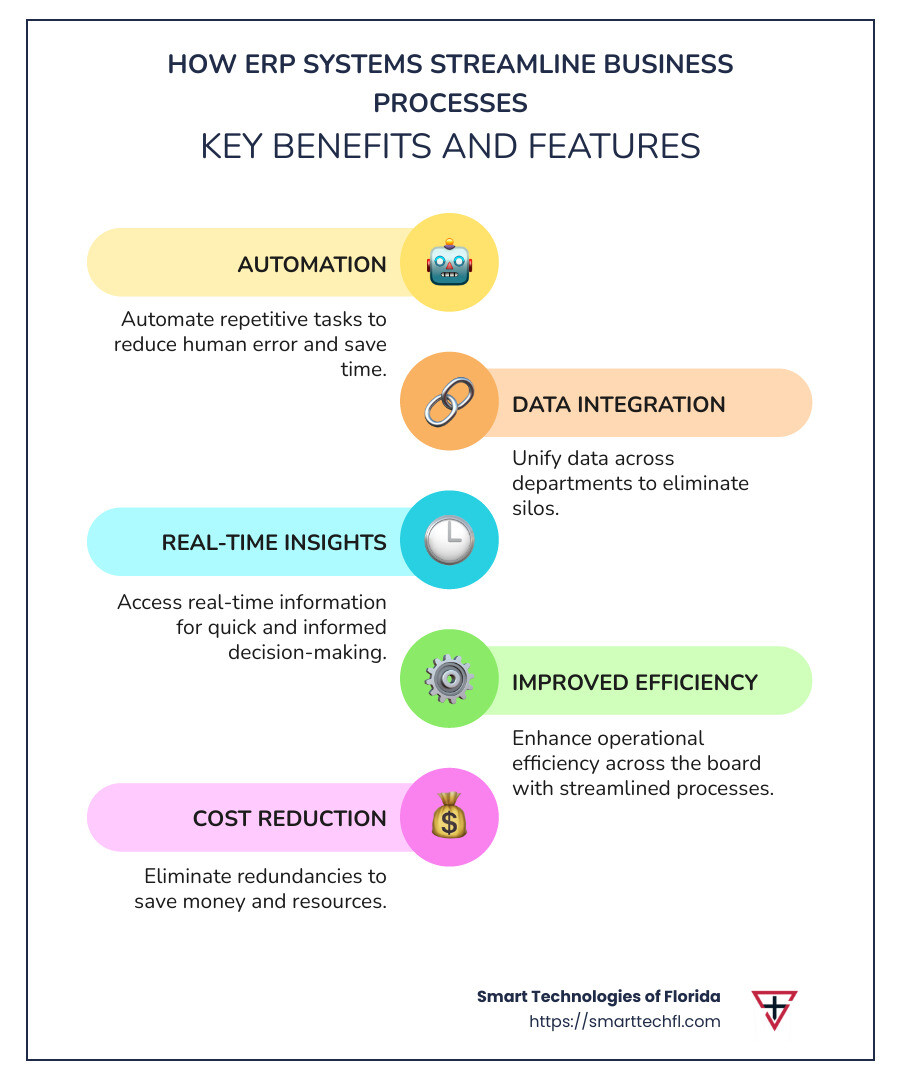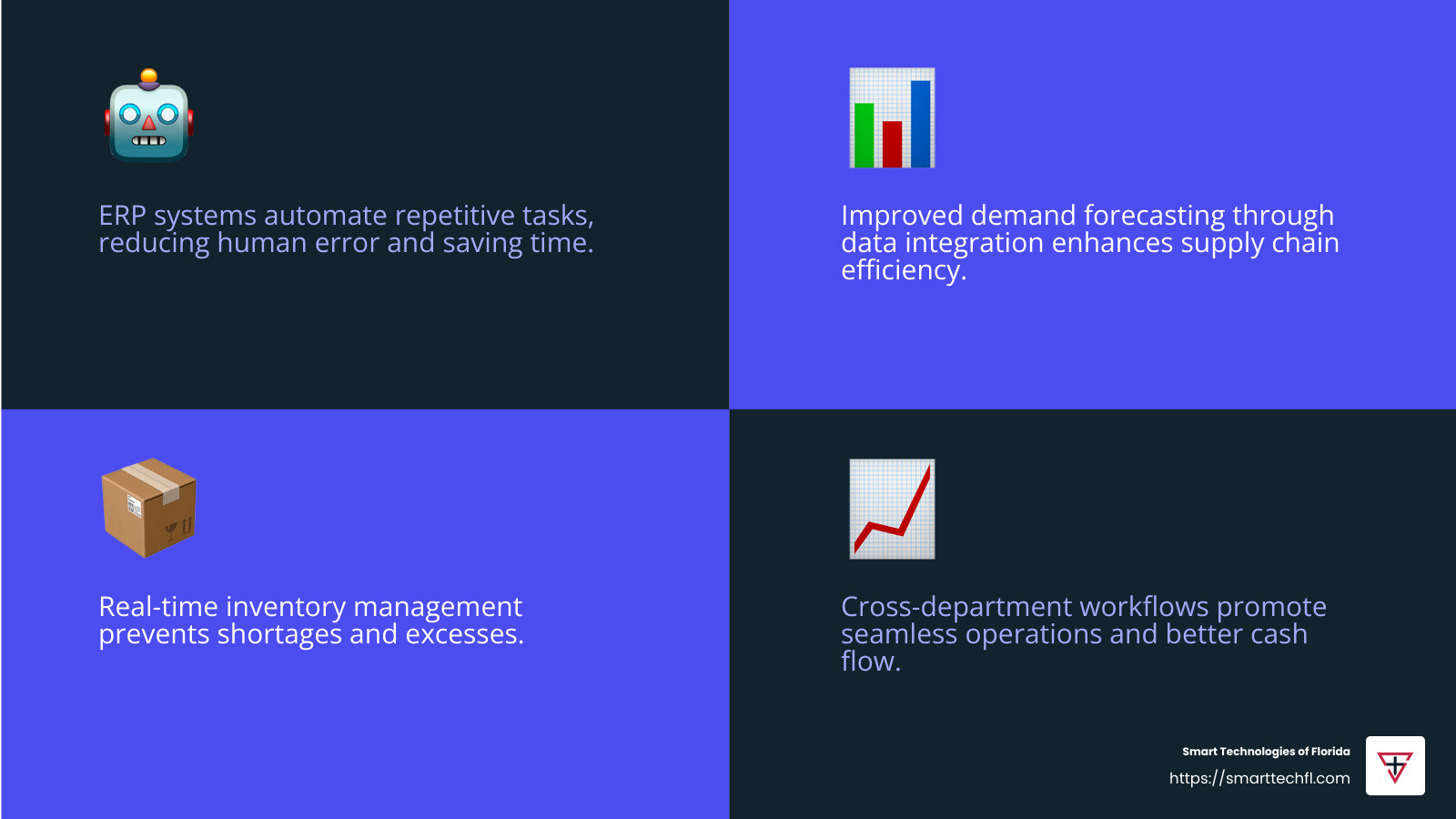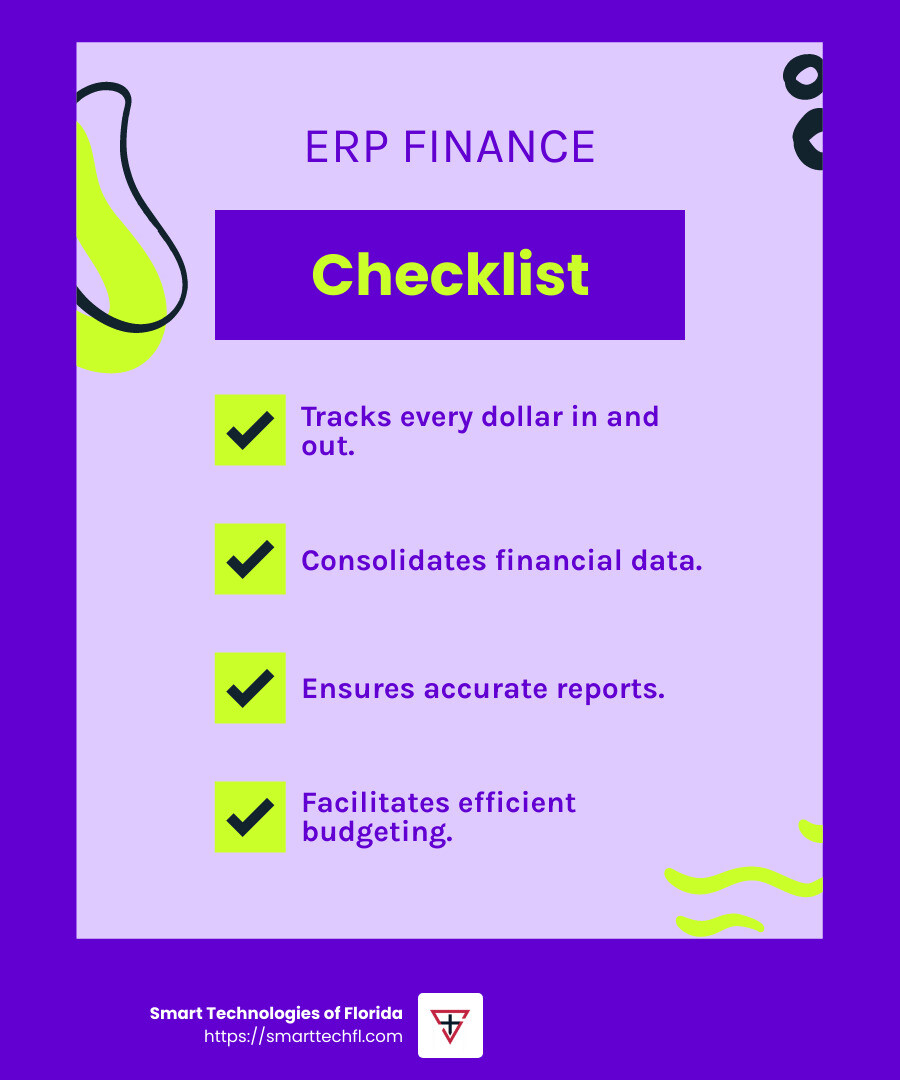ERP Systems: The Backbone of Business Operations
How do ERP systems streamline business processes? Let’s get straight to the point:
- Automation – ERP systems automate repetitive tasks, reducing human error and freeing up time.
- Data Integration – They unify data across departments, eliminating silos.
- Real-Time Insights – Access to real-time information ensures quick and informed decision-making.
- Improved Efficiency – Streamlined processes improve operational efficiency across the board.
- Cost Reduction – By eliminating redundancies, ERPs help save money and resources.
Imagine running a delightful café in the heart of Daytona Beach. As your customer base grows, managing operations using spreadsheets and manual processes becomes daunting. Errors increase, efficiency declines, and customer satisfaction takes a hit. This is where Enterprise Resource Planning (ERP) systems come in, changing how businesses, like yours, operate.
ERP systems are the unsung heroes behind successful businesses, seamlessly integrating diverse functions—like finance, supply chain, and human resources—into a unified platform. By cutting out the clutter and connecting the dots, ERP systems usher in unparalleled efficiency. When instant data access can set you apart from competitors, these systems are no longer optional but essential.
Whether it’s automating mundane tasks, providing crucial business insights, or streamlining complex operations, ERPs are the backbone of business efficiency today.

How Do ERP Systems Streamline Business Processes?
Automating Manual Tasks
ERP systems are game changers when it comes to automation. They take over repetitive tasks that once consumed hours of manual labor, like managing inventory, creating sales orders, and sending invoices. This not only slashes the time involved but also cuts down on human errors, which can be costly.
For instance, with ERP, tracking inventory levels across multiple locations is no longer a tedious manual chore. Instead, it’s automated, allowing operations managers to swiftly address shortages or excesses. This kind of automation empowers businesses to operate more efficiently and respond to market demands proactively.
Imagine a scenario where your ERP system automatically emails invoices to customers or notifies them about product availability. It also allocates inventory to sales orders without you lifting a finger. By coordinating cross-department workflows, ERP systems ensure smooth operations and improved cash flow.
Improving Demand Forecasting and Inventory Management
ERP systems shine in demand forecasting and inventory management, providing the insights needed to meet production goals and manage supply chains effectively. They deliver detailed data, such as expiration dates, which helps prioritize inventory usage and maintain optimal stock levels.
When it comes to demand forecasting, ERP systems consolidate data from various departments like sales, marketing, and customer service. This integration allows businesses to identify trends and predict future needs with greater accuracy. The result? Better planning and a more responsive supply chain.
In the world of retail and manufacturing, having real-time access to inventory data is crucial. ERP systems offer this, enabling managers to make informed decisions quickly. This capability is not just about keeping shelves stocked; it’s about ensuring that businesses can meet customer demands efficiently and economically.

Whether you’re a small business in Daytona Beach or a large enterprise, ERP systems are your secret weapon for achieving streamlined operations, improved productivity, and superior customer satisfaction.
Core Components of ERP Systems
ERP systems are like the backbone of a company, bringing together all the critical parts that keep a business running smoothly. Let’s explore three key components: Finance and Accounting, Human Resources, and Supply Chain Management.
Finance and Accounting
Finance and accounting are at the heart of any business. An ERP system helps manage these functions by automating financial transactions, budgeting, and reporting.
Imagine a single platform that tracks every dollar flowing in and out of your business. That’s what ERP does. It consolidates financial data from across the organization, ensuring that financial reports are accurate and up-to-date. This is crucial for making informed decisions and maintaining financial health.
Budgeting becomes a breeze with ERP systems. They provide tools that allow you to allocate resources efficiently and monitor spending in real-time. This means no more surprises at the end of the quarter!

Human Resources
Managing employees effectively is another critical function of ERP systems. The Human Resources module handles everything from employee management to payroll and recruitment.
With ERP, keeping track of employee information is seamless. It stores data like contact information, job roles, and performance records in one place. This makes it easy to manage payroll accurately and on time, reducing the risk of errors that could lead to unhappy employees.
Recruitment is also streamlined. ERP systems can automate parts of the hiring process, such as posting job openings and tracking applications. This means HR teams can focus more on finding the right candidates rather than getting bogged down in paperwork.
Supply Chain Management
The Supply Chain Management component of an ERP system is all about optimizing procurement, logistics, and inventory.
In today’s market, having a well-oiled supply chain is crucial. ERP systems provide real-time insights into inventory levels, helping businesses avoid costly overstocking or stockouts. This ensures that the right products are available at the right time, improving customer satisfaction and loyalty.
Procurement processes are also improved. ERP systems can automate purchase orders and track supplier performance, ensuring that you get the best deals and maintain strong supplier relationships. Logistics are streamlined as well, with ERP systems providing visibility into every step of the supply chain.
In summary, the core components of ERP systems—finance and accounting, human resources, and supply chain management—work together to create a unified platform that improves business operations. By integrating these critical functions, ERP systems help businesses operate more efficiently and make smarter decisions.
Benefits of Implementing ERP Systems
Imagine being able to see everything happening in your business at a glance. That’s what ERP systems offer. They bring a host of benefits that can transform how a business operates.
Improved Reporting and Analytics
Real-time data is a game changer. With ERP systems, managers get instant access to the latest information. This means decisions are based on up-to-the-minute data, not yesterday’s news.
ERP systems use customizable dashboards to present data in a way that’s easy to understand. Managers can spot trends, forecast future performance, and make informed decisions quickly. This kind of insight is invaluable for steering a company towards growth and profitability.
Better Inventory Management
For businesses in manufacturing or retail, managing stock is critical. ERP systems provide real-time visibility into stock levels, helping businesses maintain the perfect balance—never too much, never too little.
With features like automated reordering, ERP systems ensure you’re always stocked up on what you need. This reduces the risk of running out of products or tying up cash in excess inventory. Plus, it improves the supply chain by improving accuracy and efficiency, leading to cost savings and happier customers.
Boosting Efficiency and Productivity
ERP systems streamline processes across the board. By automating routine tasks, they free up employees to focus on more important work. This boost in efficiency means tasks get done faster and with fewer errors.
Collaboration across departments improves, too. With all data centralized, teams can work together more effectively. This leads to better communication and a more cohesive operation overall.
In summary, implementing an ERP system can significantly improve efficiency, productivity, and collaboration within a business. By providing real-time data and enhancing inventory management, ERP systems help businesses make smarter decisions and operate more smoothly.
Next, let’s explore some frequently asked questions about ERP systems to deepen our understanding.
Frequently Asked Questions about ERP Systems
How do ERP systems improve business processes?
ERP systems streamline business processes by automating tasks that were once manual and time-consuming. For instance, instead of manually entering sales orders or tracking inventory, ERP systems automate these tasks. This reduces the chance of human error and speeds up operations.
Automation not only saves time but also boosts efficiency. Employees can focus on strategic activities rather than repetitive tasks. This leads to better use of resources and higher overall productivity.
What is the role of ERP in supporting business processes?
ERP systems play a crucial role in supporting business processes by offering a unified platform for all business functions. They provide real-time insights by integrating data from across the organization. This integration allows for better decision-making, as managers have access to accurate and up-to-date information.
Moreover, ERP systems improve collaboration by breaking down silos between departments. With all teams accessing the same data, communication improves, and operations become more cohesive. This integration is key to aligning business goals and ensuring everyone is on the same page.
How do ERP systems streamline workflows?
ERP systems streamline workflows through data centralization and process standardization. By centralizing data, ERP systems ensure that everyone in the organization has access to the same information. This eliminates discrepancies and reduces the risk of errors caused by outdated or incorrect data.
Process standardization is another significant benefit. ERP systems come with industry-specific best practices that help standardize processes across departments. This consistency leads to more efficient workflows and smoother operations.
In addition, ERP systems improve communication by providing a single source of truth. Teams can easily share information and collaborate, reducing delays and enhancing overall productivity.
By automating tasks, integrating data, and standardizing processes, ERP systems make business operations more efficient and effective. They are indeed the backbone of modern business operations, driving growth and innovation.
Conclusion
At Smart Technologies of Florida, we believe that embracing change is the key to thriving in today’s business world. Our role as a Business Change Agency is to guide organizations through strategic innovation and digital change. With 23 years of experience, we understand that every business is unique and requires custom solutions to meet its specific needs.
ERP systems are a cornerstone of this change. By streamlining business processes through automation and data integration, ERP systems empower businesses to operate more efficiently and effectively. They provide the real-time insights needed for informed decision-making and help break down silos, fostering collaboration across departments.
Our people-centric approach ensures that the ERP solutions we offer not only align with our clients’ goals but also empower their teams. By automating manual tasks and improving demand forecasting, businesses can focus on strategic activities rather than getting bogged down by routine operations.
As we look to the future, our commitment to strategic innovation remains unwavering. We continue to leverage the latest technologies to provide our clients with the tools they need to adapt and grow. With ERP systems as the backbone of business operations, organizations can achieve sustainable growth and maintain a competitive edge.
Explore how Smart Technologies of Florida can help your business harness the power of ERP systems to transform and innovate. Let’s start on a journey of change and success together.












